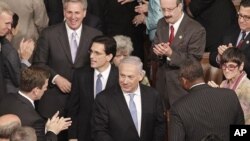Israeli Prime Minister Benjamin Netanyahu says he is ready to make "painful compromises" for peace with the Palestinians, but he says Israel will not return to its pre-1967 borders.
Mr. Netanyahu got a rousing reception when he addressed a joint meeting of the U.S. Congress Tuesday. He said his country will not go back to what he said were "indefensible" borders that existed before the 1967 Six Day War.
He said the Israeli-Palestinian conflict has not been about forming a Palestinian state, but rather that Palestinians are unwilling to accept a Jewish state. He said Israel will be generous with the size of a Palestinian state, but he added that Jerusalem will never be divided.
Mr. Netanyahu said peace can only be achieved through the negotiating table, and he voiced his opposition to a planned effort by the Palestinians to seek U.N. recognition of statehood in September. He said Israel will not negotiate with a Palestinian government backed by the Islamic militant group Hamas, which he described as the Palestinian version of al-Qaida.
He also warned of the dangers of a nuclear-armed Iran, saying the nightmare of nuclear terrorism would be a clear and present danger throughout the world.
Afforded the rare honor of addressing a joint meeting of Congress, Mr. Netanyahu also highlighted the strong ties between his country and the United States, describing Israel as an unwavering ally. He congratulated the U.S. on the killing of Osama bin Laden, the mastermind of the 2001 terrorist attacks on the U.S., saying, "Good riddance."
On Monday, he told a meeting of the American Israel Public Affairs Committee that peace will only come when Palestinians recognize Israel's right to exist.
U.S. President Barack Obama told the same pro-Israeli lobbying group on Sunday that Israel must "make the hard choices" necessary to reach a peace agreement. He said they include basing the borders of Israel and a Palestinian state on the 1967 lines with mutually agreed swaps of territory.
The prime minister said Monday that peace will not solve all the endemic problems in the Middle East. He said what is needed is genuine democracy that includes elections, freedoms of speech, press and assembly, and rights for women, gays and minorities.
In his speech to the U.S. Congress, Mr. Netanyahu described Israel as an example of democracy in the Middle East.
During his visit to the U.S., Mr. Netanyahu met at the White House with President Obama and Vice President Joe Biden.




